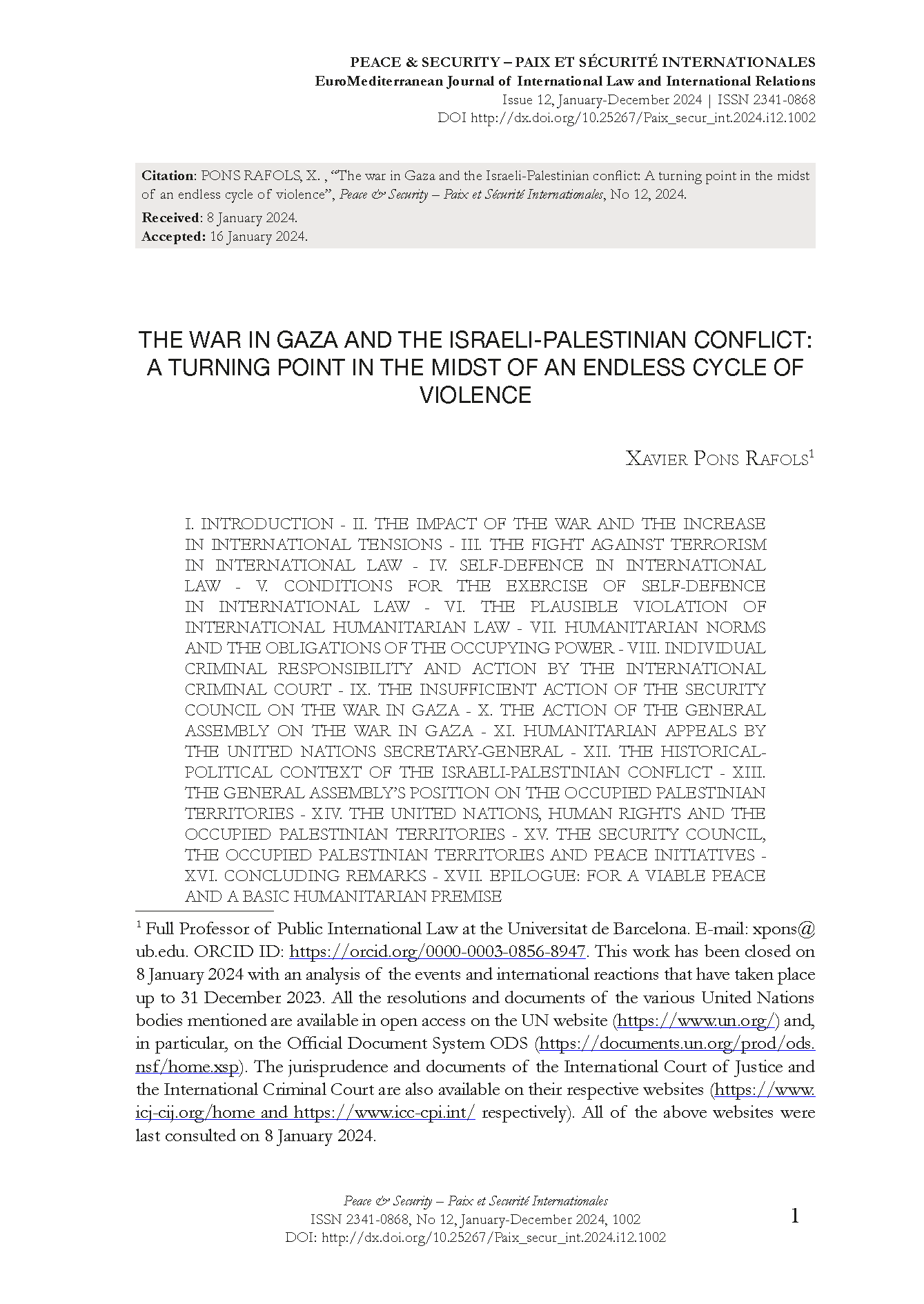The war in Gaza and the Israeli-Palestinian conflict: A turning point in the midst of an endless cycle of violence
Abstract
The purpose of this essay/editorial - closed on 8 January 2024 - is to formulate as fully as possible, although necessarily provisional, an approach from the perspective of International Law to the war in Gaza that began a little over three months ago, and more generally to the Israeli-Palestinian conflict that has lasted at least seventy-five years, with the creation of the state of Israel, the first Arab-Israeli war and the Nakba to which the Palestinian people have been condemned. In other words, this is a brief international legal approach to a moment of crisis and intensification of a historic conflict that, in these months, has been a real turning point in the endless cycle of violence that has plagued the region for decades.
To this end, this essay addresses various issues of international legal relevance in relation to the current war in Gaza, such as the conceptualisation of international terrorism; the justification of legitimate self-defence used by Israel and, in particular, the conditions required by International Law for its exercise; as well as the possible commission of serious crimes of international concern - war crimes, crimes against humanity and genocide -, the applicability of International Humanitarian Law and the call for individual criminal responsibility in this context.
This essay also analyses the response of the international community organized in the United Nations to the current war in Gaza, highlighting the insufficient action of the Security Council during these months of acute crisis, the majority reaction of the General Assembly calling for a cessation of hostilities, and the repeated and futile humanitarian appeals made by its Secretary-General.
In order to place the current crisis in the perspective of the Palestinian-Israeli conflict, there are also briefly discussed the historical and political context, in particular the results of the occupation of territories in the Six-Day War of 1967, the consistent position of the General Assembly on the Palestinian question, the United Nations action on human rights in the Occupied Palestinian Territories, as well as the Security Council’s action on these Territories and the proposed peace initiatives, in particular with regard to the two-State solution.
The essay concludes with concluding remarks and an epilogue where, in view of the current humanitarian catastrophe and the protracted nature of the conflict, calling for an immediate cessation of hostilities and the release of hostages, and for the current phase of the conflict to become a genuine turning point that can be grasped as an opportunity for peace in the region.
Keywords
Downloads
How to Cite
License
Copyright (c) 2024 PEACE & SECURITY-PAIX ET SÉCURITÉ INTERNATIONALES (EuroMediterranean Journal of International Law and International Relations)

This work is licensed under a Creative Commons Attribution-NonCommercial 4.0 International License.
Copyright
Es condición para la publicación que el autor o autores ceda(n) a la Revista, en exclusiva, los derechos de reproducción. Paix et Sécurité Internationales es una revista que proporciona un acceso abierto inmediato a su contenido totalmente gratuito para lectores como para los investigadores que pretendan publicar en ella, ya que no se realizan cobros por concepto de envío, procesamiento ni publicación. Los usuarios podrán leer, descargar, copiar, distribuir, imprimir, buscar o enlazar el texto completo de los artículos publicados, o utilizarlos para cualquier otro propósito, dentro de la legalidad vigente. Y podrán hacerlo sin coste alguno, y sin necesitad de solicitar permiso al editor a al autor. Todo ello de acuerdo con la definición de acceso abierto de la Iniciativa Acceso Abierto de Budapest.







